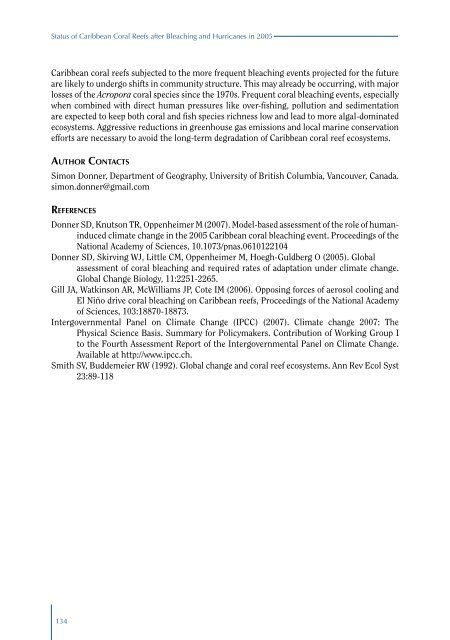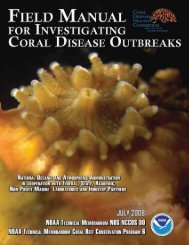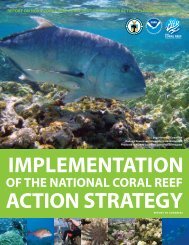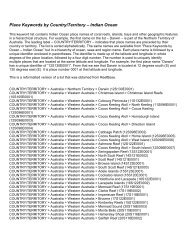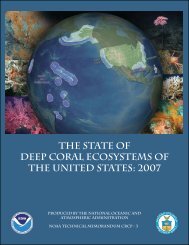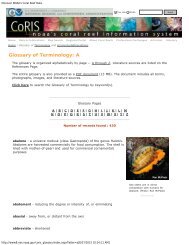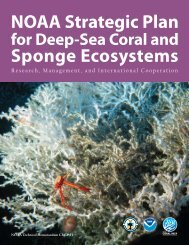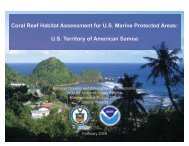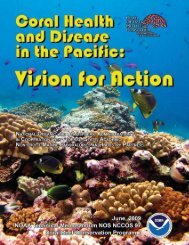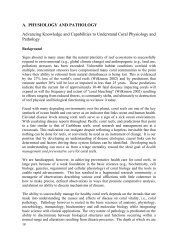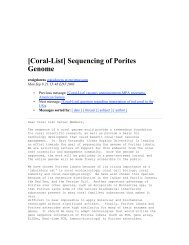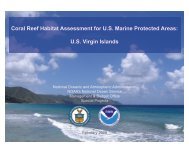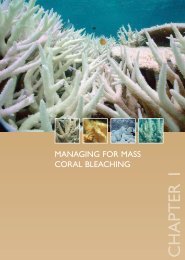Status of Caribbean coral reefs after bleaching and hurricanes in 2005
Status of Caribbean coral reefs after bleaching and hurricanes in 2005
Status of Caribbean coral reefs after bleaching and hurricanes in 2005
Create successful ePaper yourself
Turn your PDF publications into a flip-book with our unique Google optimized e-Paper software.
<strong>Status</strong> <strong>of</strong> <strong>Caribbean</strong> Coral Reefs <strong>after</strong> Bleach<strong>in</strong>g <strong>and</strong> Hurricanes <strong>in</strong> <strong>2005</strong><strong>Caribbean</strong> <strong>coral</strong> <strong>reefs</strong> subjected to the more frequent <strong>bleach<strong>in</strong>g</strong> events projected for the futureare likely to undergo shifts <strong>in</strong> community structure. This may already be occurr<strong>in</strong>g, with majorlosses <strong>of</strong> the Acropora <strong>coral</strong> species s<strong>in</strong>ce the 1970s. Frequent <strong>coral</strong> <strong>bleach<strong>in</strong>g</strong> events, especiallywhen comb<strong>in</strong>ed with direct human pressures like over-fish<strong>in</strong>g, pollution <strong>and</strong> sedimentationare expected to keep both <strong>coral</strong> <strong>and</strong> fish species richness low <strong>and</strong> lead to more algal-dom<strong>in</strong>atedecosystems. Aggressive reductions <strong>in</strong> greenhouse gas emissions <strong>and</strong> local mar<strong>in</strong>e conservationefforts are necessary to avoid the long-term degradation <strong>of</strong> <strong>Caribbean</strong> <strong>coral</strong> reef ecosystems.Au t h o r Co n ta c t sSimon Donner, Department <strong>of</strong> Geography, University <strong>of</strong> British Columbia, Vancouver, Canada.simon.donner@gmail.comReferencesDonner SD, Knutson TR, Oppenheimer M (2007). Model-based assessment <strong>of</strong> the role <strong>of</strong> human<strong>in</strong>ducedclimate change <strong>in</strong> the <strong>2005</strong> <strong>Caribbean</strong> <strong>coral</strong> <strong>bleach<strong>in</strong>g</strong> event. Proceed<strong>in</strong>gs <strong>of</strong> theNational Academy <strong>of</strong> Sciences, 10.1073/pnas.0610122104Donner SD, Skirv<strong>in</strong>g WJ, Little CM, Oppenheimer M, Hoegh-Guldberg O (<strong>2005</strong>). Globalassessment <strong>of</strong> <strong>coral</strong> <strong>bleach<strong>in</strong>g</strong> <strong>and</strong> required rates <strong>of</strong> adaptation under climate change.Global Change Biology, 11:2251-2265.Gill JA, Watk<strong>in</strong>son AR, McWilliams JP, Cote IM (2006). Oppos<strong>in</strong>g forces <strong>of</strong> aerosol cool<strong>in</strong>g <strong>and</strong>El Niño drive <strong>coral</strong> <strong>bleach<strong>in</strong>g</strong> on <strong>Caribbean</strong> <strong>reefs</strong>, Proceed<strong>in</strong>gs <strong>of</strong> the National Academy<strong>of</strong> Sciences, 103:18870-18873.Intergovernmental Panel on Climate Change (IPCC) (2007). Climate change 2007: ThePhysical Science Basis. Summary for Policymakers. Contribution <strong>of</strong> Work<strong>in</strong>g Group Ito the Fourth Assessment Report <strong>of</strong> the Intergovernmental Panel on Climate Change.Available at http://www.ipcc.ch.Smith SV, Buddemeier RW (1992). Global change <strong>and</strong> <strong>coral</strong> reef ecosystems. Ann Rev Ecol Syst23:89-118134


